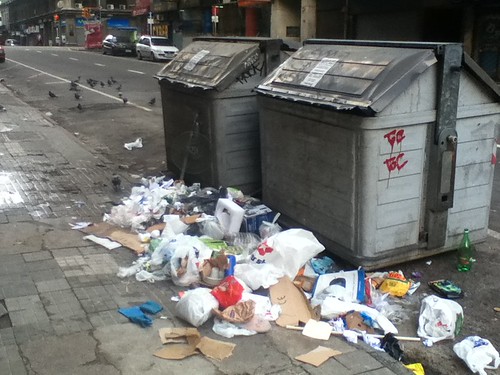I have spent the better part of this week in Montevideo (Uruguay), a coastal city right across from Buenos Aires (Argentina), and a perfect laboratory for someone who does the kind of research I do (leather science, informal waste picking, water privatization in Latin America, sanitation). The reason that brought me here (the CLAD 2013 Congress) was presenting a paper on decentralization of environmental policy in Mexico. However, as I normally do whenever/wherever I travel, I prepared myself to undertake some fieldwork and explore the city.
I wanted to see whether the city of Montevideo would offer an interesting site to come back and undertake a more in-depth fieldwork period. After all, it is a coastal city, in South America, part of a binational river basin. I was pretty sure it faced similar problems/issues as Buenos Aires and perhaps other cities worldwide. Vancouver (where I lived for more than a decade) is also a coastal city and one that could very well be compared to Montevideo and Buenos Aires.
As I was roaming the streets and exploring some of the poorest areas of Montevideo (particularly towards Ciudad Vieja), I was floored to see the dramatic inequalities in this city. There were homeless people sleeping right besides the Embassy of France in Uruguay. You could walk less than 100 feet and be at a beautiful opera house. There was a brand new, boutique hotel right in the middle of Ciudad Vieja (where some areas could be very well rivaling Vancouver’s Downtown East Side in terms of poverty and inequality).
Several of these folks were rummaging through the trash containers located every few blocks. This is not an uncommon process for informal waste recyclers, and it is one that similars what happens in Aguascalientes (Mexico). When I saw people picking waste, I was confronted with a conundrum and an ethical dilemma: taking a photo of the informal waste recycler while she was picking the trash would be quite illustrative of the process dynamics. However, if I took a photograph, I would feel as though I am violating that person’s privacy. I felt that I would be violating some sort of unwritten ethical rule where you don’t take photos of vulnerable populations.
This probably comes from my own PhD training in Canada, where ethics review boards are quite strict in how they approach field research that involves human subjects. But at the more profound level, I felt it was unethical to take photos of people who have traditionally been marginalized. Of course, I ended up refraining from taking the photo, but I do acknowledge that the thought crossed my mind. Clearly, it was a good decision to not act on my thought/impulse, but I wonder if everyone stops to reflect on these issues and what the ethics of fieldwork in vulnerable communities are. I’m hoping this blog post helps start a conversation around the topic.


Hi Raul! This is a very interesting point. I’ve been wondering about that as well. I live in New Zealand, where I am currently a PhD candidate working in the social sciences. Now my research does not expose people too much, as I am studying their reactions and adaptation capacity to climate. However, I wish to combine this topic with climate change and health issues in the future. I am from the south of Brazil (very close to Montevideo actually) and, although at this stage I am not sure where my next research will be developed I wish to work there at some stage. I am sure I will face these discomfort as well, as here in NZ the ethics requirements are very strict and in Brazil I don’t think they are… I do appreciate you put this question forward, it is surely something that deserves to be considered. Cheers
I appreciate that you think about these things, as an increasing number of ‘slum tourists’ and the like are literally sightseeing without thoughts of marginalization. I’ve taken a series of photos of falling apart fish houses in my work, but always after asking permission and explaining why I want the photo (not just ogling at misfortune). No one has yet said no.